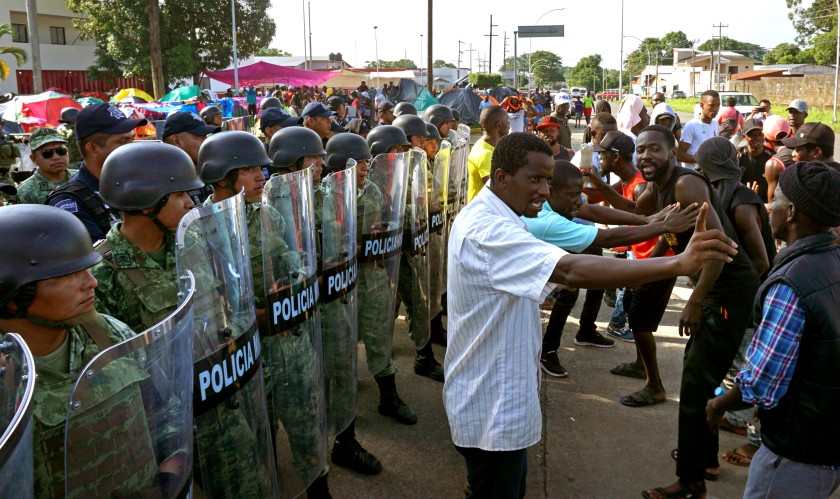About 250 African nationals have set up tents in Tapachula, Mexico after sneaking across borders in hopes of starting a new life in the United States. The migrants are currently stuck in a detention camp in Mexico because they have been denied travel visas to proceed north.
There is currently a protest happening because African immigrants are fed up. Handwritten banners say things like “Africa weeps. Free us.”
Diop Abou, a 33-year-old native of Mauritania tells the Los Angeles Times, “We are fed up. None of us want to be here in this miserable place.”
The camps are in horrible conditions with mosquitos breeding in puddles and immigrants complaining of stomach cramps, skin rashes, and other health conditions.
Protests began a month ago in the tent city at the entrance of the federal immigrant detention center, Siglo 21 in Tapachula.
According to the Los Angeles Times, Mexican authorities captured 4,779 migrants from Africa in the first seven months of 2019. This number is almost four times the amount detained during the same time frame of 2018. Only two were deported.
Many Africans are stuck because their native countries have no embassies or consular representatives in Mexico. Some of the migrants have no proper identification which also adds to reasons why they’re stranded.
Elvis Azo, a 29-year-old from Cameroon says he fled because “the military comes after anyone who speaks English. They burn houses. They kill people.”
African migrants escaped in search of “the American dream” after hearing stories of other migrants reaching the U.S. through Mexico.
Most of the migrants began their journey by flying to Brazil, Ecuador, and other South American countries. They then made their way to Mexico in buses, boats and on foot.
Julia Kyala, a 12-year-old from the Democratic Republic of Congo recalled her journey saying: “We were in the forest in Panama, and I was very frightened. I was swept into a river, I thought I would drown. My mother came to rescue me, but she was also taken by the current. Then a man came and helped get us out and saved us.”
Migrants also saw dead bodies while traveling through the jungle.
“This is what we saw in the jungle in Panama — dead people! We saw bodies! Many bodies!”, says a Ghanaian man.
The migrants made their way to Guatemala then got on smuggler’s rafts made out of wooden planks to cross the Suchiate River to Mexico.
If they successfully get to the U.S., their plans are to seek asylum.
As a result of the ongoing protest, Mexican authorities have been in disagreement. Many Mexican authorities view the African migrants as being illegal squatters.
Mexico has provided little help to the living conditions of the migrants — they’ve set up portable toilets and an on-site ambulance in case of a medical emergency.
Mexican authorities have offered asylum in Mexico to the African migrants but they have refused.
Marcele Ebrard, the Mexican foreign secretary, told reporters earlier this month: “In essence, what these people want is for Mexico to allow them to proceed to the United States with no legal status, the equivalent of saying there is no border.”
Isaac Junior, a 28-year-old from Cameroon says, “We don’t want to be in Mexico. We don’t feel safe here. We don’t speak the language.”
A new Trump administration policy states that U.S. officials will not consider asylum applications from non-Mexicans arriving at the southwest border. The only exception would be if they already filed for protection and it was turned down in one of the countries they pass through on their journey.
This new policy can significantly lower their chances of getting into the U.S.
Rumi Tmamba, a 17-year-old native of Congo has hopes of getting to the U.S. to enroll in university and study international relations.
“We just want to get out of here and arrive in a better place. If not the United States, then maybe Canada. But we have come this far in search of this dream. We are not going back now.”
All migrants are determined to move on despite the misinformation being fed of U.S. immigration policies.





